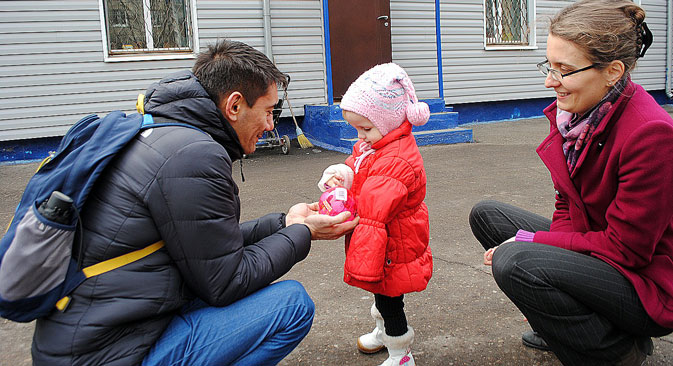
Russian Supreme Court allowed a Russian-speaking family from Germany to adopt a Russian girl Elya.
Press photoAbandoned by her biological mother at birth, Elya has spent her whole life in an orphanage. She was born with deformed arms. She cannot wash her face or get dressed without somebody else’s help. Yet no couples were willing to adopt the girl in Russia, where adoption remains rather rare and is socially stigmatized.
Fortunately for Elya, a Russian-speaking family from Germany, Yulia and Alik Beisenov, came forward and applied to adopt the girl. The Beisenovs, who originally come from the former Soviet republic of Kazakhstan, have been living in Germany for 10 years and already have three children of their own, aged 13, eight and four.
The family collected all the necessary documents, completed a course for adoptive parents, and arranged for the girl to have the necessary treatment for her arms in Germany.
In September this year, the Primorsky Territory regional court rejected the Beisenovs’ request to have Elya adopted, according to lawyer Alexander Golovanov. The reason given was that should the adoptive parents die, the girl might be adopted by a same-sex family.
The court’s verdict was odd for two reasons: Firstly, none of the documents that regulate adoption in Russian law (the Civil Procedure Code of Russia, the Family Code of Russia, and the Federal Law On Acts of Civil Status) contain any direct restrictions or bans on homosexual people adopting – though in any case these documents are binding only in Russia and not in Germany.
Secondly, there is a law in Germany forbidding same-sex couples from jointly adopting children – if one person already has a biological child, the other partner may adopt the child, but the two may not adopt a child together.
Thousands of internet users collected signatures to have the Russian court’s ruling annuled, posting photos with the caption: “Elya should have a mum!” In a matter of several months, the petition gathered over 350,000 signatures, with people from all over the country sending letters of support and sympathy to the Beisenovs.
Yulia Beisenova even wrote a letter to Russian President Vladimir Putin, Patriarch Kirill and chairman of the Supreme Court Vyacheslav Lebedev, asking for their assistance in having Elya adopted.
Meanwhile, lawyer Alexander Golovanov involved Russian children’s rights ombudsman Pavel Astakhov in the case, who said that “the Primorsky Territory regional court misinterpreted the law.”
According to Astakhov, it was not the first time that this had happened. In a similar case two years ago, after intervention of the children’s rights ombudsman, the Russian Supreme Court allowed a Swiss family to adopt a Russian boy, having overturned a ruling by a lower court in Volgograd. In both cases, the regional courts banned foreign nationals from adopting Russian children, citing a hypothetical possibility that the children might end up in a same-sex family.
“Over the past two years, German nationals have adopted some 70 children from Russia,” Golovanov told RBTH. “Most of these decisions were taken by lower courts. Which means that the Primorsky Territory regional court made a blunder.”
The lawyer said that the German couple had passed psychological tests and assessment twice, in order to convince the Russian court that they were a heterosexual couple.
Fortunately, this story had a happy ending. A couple of weeks before the New Year, the Supreme Court ruled that Elya would be better off living in a family rather than in an orphanage for disabled children.
The head of a regional public organization for protecting children’s rights called A Child’s Right, Boris Altschuler, says that the girl was lucky that the Supreme Court allowed her to join a family.
“It is in the child’s interests to be in a family with adoptive parents, who will love her, will take care of her and will help her get proper medical treatment,” he said.
“The girl would have been denied all this had she remained in the children’s home. There she would have forever remained a disabled person unable to take care of herself.”
According to Altschuler, the Supreme Court ruling could serve as guidance for the lower courts.
“Of course, Russia’s judicial system is not based on precedent. The ruling in Elya’s case will not have a direct impact on court decisions in similar cases,” he said.
“However, this court battle hit the headlines. It showed that an unjust ruling that violates a child’s rights can be overturned. This will have a favorable effect on the overall climate surrounding child adoption by foreigners.”
All rights reserved by Rossiyskaya Gazeta.
Subscribe
to our newsletter!
Get the week's best stories straight to your inbox